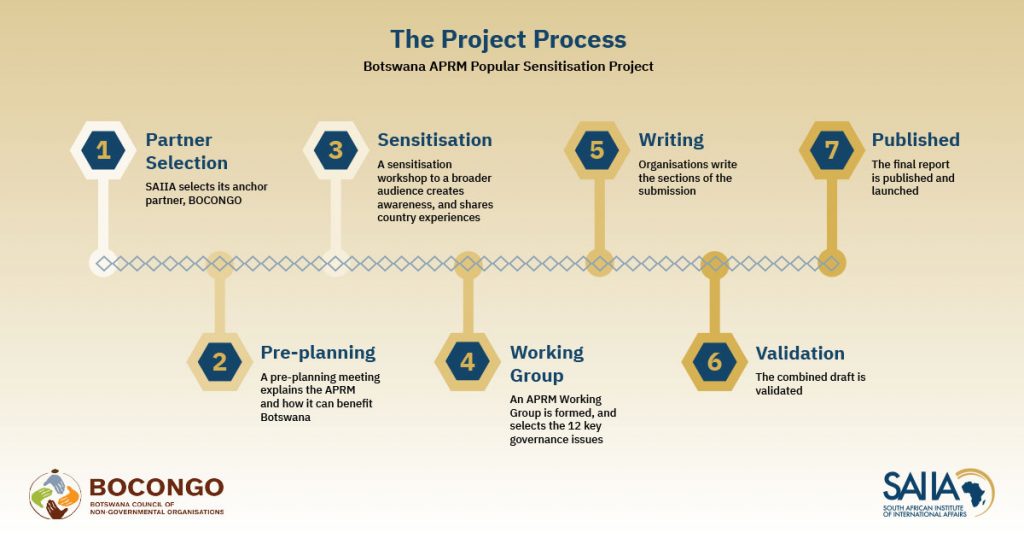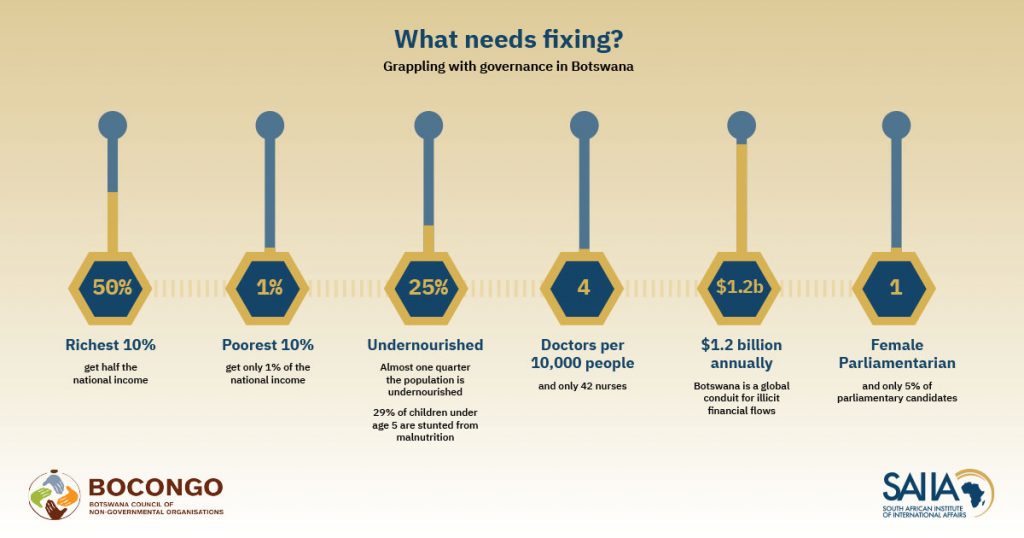This project is being implemented by the South African Institute of International Affairs (SAIIA) in Johannesburg, in partnership with the Botswana Council of Non-Governmental Organisations (BOCONGO), in Gaborone.
The APRM, established in 2003, is Africa’s premier governance self-assessment and promotion tool. The purpose of the APRM is “to foster the adoption of policies, standards and practices that lead to political stability, high economic growth, sustainable development and accelerated sub-regional and continental economic integration through reinforcement of best practices, including identifying deficiencies and accessing the needs for capacity building,” according to its founding documents.
In February 2019, Botswana became the 38th African Union member state to voluntarily accede to the APRM. The country’s President Mokgweetsi Masisi, who signed the Memorandum of Understanding with the APRM, was quoted saying that Botswana has always believed in good practices when it came to good governance and stood to gain a lot from countries that are members of the APRM.
The APRM is not just a government review, but a country review, in which civil society organisations (CSOs) are important stakeholders. It is a requirement that civil society be involved in a country’s APRM process. Botswana’s APRM process thus provides its CSOs with an historic opportunity to engage with government to address existing challenges, improve outcomes and ensure that the country continues on a successful democratic and socio-economic trajectory. The APRM specifically provides a platform to promote a wide range of governance issues that CSOs feel passionately about, through evidence-based submissions. But the extent of their involvement is up to the CSOs, depending on how informed, interested and mobilised they are.
There are several potential benefits stemming from Botswana’s accession to the APRM. The APRM will produce a comprehensive governance assessment of the country’s strengths and weaknesses, and develop recommendations to remedy shortcomings. The APRM can catalyse and bolster reform efforts, and open civic space for CSOs and citizens through the dialogue it promotes. It is also an opportunity for Botswana to explain and showcase its best practices to its peers, and to build capacity in local CSOs. A well-run, inclusive and transparent process can promote accountability in the country, and potentially attract investors and development assistance. And the more SADC countries that are encouraged to accede, the easier it is to deal with cross-boundary issues, including climate, health and migration.
The process so far
- SAIIA team members Steven Gruzd and Nhlakanipho Zikalala travelled to Gaborone from 9 to 11 March 2020, to lay the groundwork for the project and meet with civil society and government representatives.
- Read the news coverage and report on the meeting held from 9 to 11 March.
- Download the presentations: Background on the APRM and APRM lessons from Namibia.
- A Sensitisation Workshop was held on Zoom due to the COVID-19 restrictions on 20 May 2020.
- A Working Group Meeting was held on Zoom due to the COVID-19 Restrictions on 9 June 2020. It focused on discussing issues for the Botswana APRM CSO submission.
- APRM Civil Society Working Group meeting to finalise issues for the submission, 7 July 2020.
- A Validation Workshop was held on Zoom on 10 November 2020: The big governance issues in Botswana: A civil society submission to the APRM
- A report of the Civil Society APRM Submission Launch held on 20 April 2021 via Zoom
- To become involved in BAPS, please contact BOCONGO.
Find out how a similar project unfolded in Namibia.
Watch a video about the process
View the infographics



Useful links
- The South African Institute of International Affairs (SAIIA)
- The APRM Secretariat
- Botswana Council of Non-Governmental Organisations (BOCONGO)
- The APRM Toolkit – an online repository of APRM official documents and academic analysis
- Mastering the APRM: Creating Your Submission
- Monitoring APRM Implementation: A Civil Society How-To-Guide
- Handbook for African Civil Society (June 2008)
- Download the publication: Governance at a Glance: Botswana’s APRM Experience
Download the report: The big governance issues in Botswana – A civil society submission to the African Peer Review Mechanism
See how a similar process unfolded in Zimbabwe and South Africa
The project partners would like to thank the Government of Sweden and the Swedish International Development Cooperation Agency (SIDA) for their generous support.




